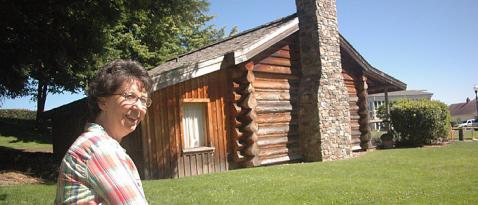Extraordinary history made by ordinary people
Mary Bowlby, '99, is executive director of Old Town Tacoma's Job Carr Cabin Museum.

Mary Bowlby, ’99, helps Tacoma keep its history alive.
The executive director of the Job Carr Cabin Museum in Old Town, Bowlby has a unique passion for educating people, children in particular, about Tacoma’s early years.
“I do this because I want children to understand our history in order to build a sense of the importance of civic engagement. The city we live in today is a direct result of actions and decisions of ordinary people — people like us,” she says.
“It’s not all giants of industry and government that make history. History is common people making simple decisions with extraordinary results. Job is an excellent example of that.”
Job Carr was the first non-native settler in the Tacoma area, established the first post office and was Tacoma’s first mayor.
“Our purpose here is to preserve the stories of Tacoma’s early settlers and how Tacoma began,” says Bowlby.
Bowlby studied history and non-profit management while at UW Tacoma, which led her to work with a number of museums and eventually brought her to the Job Carr Cabin Museum.
As a student, Bowlby was a staff member for the inaugural issue of Tahoma West, UW Tacoma’s student-run literary journal, and served as managing editor for the third issue. Working on the publication, she learned to hone her writing skills and expand her way of thinking. Now she uses her writing ability to promote the museum on the web.
“Tahoma West and the courses I took taught me how to stretch my understanding in writing and keep working on it. It was the ability to bring together people with disparate ideas to synthesize and create something.”
The museum itself is actually a log cabin, a replica of the one Carr built in 1865, less than two blocks from its original location. Entering the museum, visitors take a trip back in time to the mid-1800s — no Delorean needed. You are likely to be greeted by one of the museum’s eight docents, who are eager to share their knowledge of Tacoma’s early history.
The furnishings and decorations are rustic and true to the time period that Job Carr and his family lived in. Artifacts similar to the ones the Carr family would have used, such as toys, tools and even an old-fashioned camera, line the floors and walls. Actual journals and photos from the Carr family are also on display.
Perhaps the most striking installation in the museum is a life-sized, talking Job Carr mannequin. His head and eyes move as he relates what it is like being the first postmaster of Tacoma.
The museum has an extensive field trip program, coordinated by the cabin's program director, Kathy Westlin, which teaches children about Tacoma's history and pioneer life. Actors in period costumes portray early settlers for scheduled field trips. The museum provides teachers with the School Trunk Tour, a three- to four-week curriculum that teaches children about life on the Oregon Trail, with games and activities that come with a mini-Conestoga wagon.
The museum's docents and volunteers are encouraged to study the history of Tacoma and Job Carr to expand their knowledge for sharing with guests. Bowlby spends time at the Tacoma Library studying up on Job Carr because, for her, this is a personal passion.
“I was born in Gig Harbor, but I grew up here and have significant family history in Tacoma,” she says.
Bowlby serves as treasurer on the board of directors for the Heritage League of Pierce County, a consortium of more than 40 heritage organizations and individuals dedicated to preserving the county's history, and works as a consultant for the Lakewood Historical Society, assisting with organizing the group’s artifacts.
Bowlby is active in other aspects of Tacoma’s community as well; she is a brand-new member of the UW Tacoma Alumni Council and has played guitar as Grace Baptist Church's choral director for the past 20 years.
On Sunday, July 18, the Job Carr Cabin Museum will present the Pioneer Day Festival and Living History Walking Tour. The event will include music, demonstrations and activities, such as learning to wash your clothes on a washboard and panning for gold, as well as the tour of Old Town, featuring living-history reenactors.



